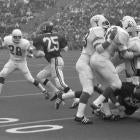The worst was when Greg Ploetz -- a true Texas football hero if there ever was one -- lashed out at his wife in the throes of dementia.
"Bottom line was, these men they literally lose their minds," Ploetz's wife, Deb, said recently.
That's why, on Thursday, she filed a wrongful death lawsuit blaming her husband's 2015 death -- among other issues -- on lax NCAA guidelines regarding head trauma.
Greg Ploetz, who played defensive tackle for the 1969 Texas national champions, was diagnosed with Stage 4 Chronic Traumatic Encephalopathy (CTE) after his death. Stage 4 is the worst form of the disease.
The suit alleges the NCAA knew or should have known about the risks relating to repeated blows to the head. It does not specify damages.
The suit further states the NCAA didn't implement return-to-play guidelines for those with head injuries back then. The University of Texas is not named in the action.
"My reason for filing a lawsuit is I'm a little bit upset with the system," Deb Ploetz said. "No one seems to be listening. People seem to be listening but not the right people."
Her husband, Deb said, declined quickly after 2009.
"He become more child-like," she told CBS Sports. "You've lost all your cognitive ability. I would say, 'Please sit down.' If he didn't want to sit down, he would push me."
The couple was married 37 years.
CTE is now widely thought to be the result of repeated blows to the head -- in this case -- from football. What makes Ploetz's case so unique is that he did not play professional football. His symptoms did not begin until 2005, 33 years after he stopped playing for the Longhorns.
"Stage 4 ... [are] athletes who have had the greatest exposure in terms of years of playing and who have lived the longest," said noted head trauma expert Dr. Robert Cantu.
Cantu examined Ploetz's brain, which was donated by his wife to the Concussion Legacy Foundation at Boston University.
"The disease, which doesn't necessarily stop when you stop playing, has had a lot of years to keep percolating," Cantu added.
Greg Ploetz died at age 66 in May 2015. His wife described the struggles of watching a once vibrant husband and father who taught art lose his memory and cognitive skills.
Deb Ploetz said she spent $200,000 of personal money shuttling her husband around as he was kicked out five memory care facilities.
"He couldn't even use his cell phone," she said. "Watching him was hell."
A documentary film in development shows an increasingly confused Ploetz lashing out at his wife. The film was made available for viewing by CBS Sports. The family preferred not to make it public in its entirety while they consider submitting it for the South by Southwest Film Festival later this year in Austin.
Ploetz's case is believed to be among those filed by former college athletes that reach furthest into the past. Ploetz played in the 1969 Texas-Arkansas "Game of The Century." He was a captain under coach Darrell Royal, and his last game was the 1972 Cotton Bowl.
The NCAA has developed more stringent return-to-play guidelines in head trauma cases. The problem is enforcing those guidelines. There are no penalties for schools that don't follow through.
The guidelines came about as the result of a landmark class-action suit settlement last year.
College and pro football already are beginning to lower the risk of head trauma by reducing the hits players take each year. A maximum number of full-padded practices per season has been negotiated by the NFL Players Association.
Several FBS conferences now mandate a maximum of two full-padded practices per week during the season. Last year, the Ivy League removed full-contact hitting during regular-season practices as a way to reduce head trauma risk.
Cantu told CBS Sports "50-60 percent" of head trauma injuries can be reduced by making full-contact practices "skill drills."
"I think we're going to see a lot more of it," he added. "You can also start playing later [in life]. Learn the skills but don't bash heads [earlier]."
Eugene Egdorf of Shrader and Associates will be the lead attorney. It was Egdorf who successfully fought the NCAA in the Dale Lloyd case. In 2009, the NCAA agreed to begin testing for sickle cell trait as a condition of a settlement. Lloyd, a Rice player, had previously died from overexertion from sickle cell trait.
"We're going to be taking the position the NCAA had knowledge and awareness with head trauma, the repeated hits to the head, yes, even as far back as the early 1970s," Egdorf said of the Ploetz case.
"What you have is a scenario where athletes were not informed of the risks they were susceptible to that were known or should have been known by the NCAA."





















